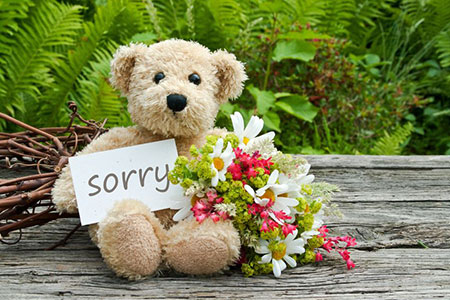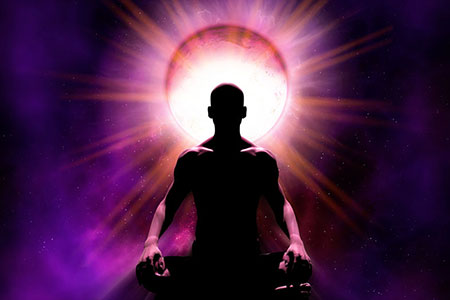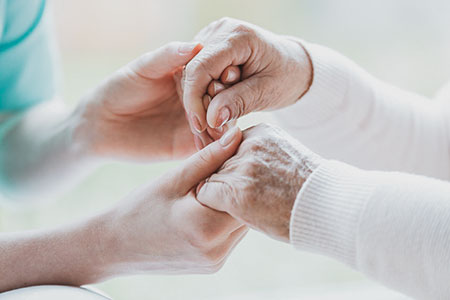forgiveness
The Divine Justice Of Karmic Lessons
 We sometimes feel we have been wronged by others in some awful way, and then we wonder if the perpetrators will get their ‘come uppance’ or ‘just deserts.’ We wish to know if divine justice will be served upon them.
We sometimes feel we have been wronged by others in some awful way, and then we wonder if the perpetrators will get their ‘come uppance’ or ‘just deserts.’ We wish to know if divine justice will be served upon them.
Sometimes we are so upset or angry that we would like to see this retribution happen immediately and right before our very eyes. In these emotional moments we are out for revenge and want to see the other person reap what they’ve sown. We believe it may bring us some peace that justice has finally been done.
As a youngster, I often heard my mother refer to it as “The Law of Return,” suggesting that whatever we put out there, both good and bad, will always come back to us. She would say that it always comes back to us tenfold!
There are also spiritual teachings and wisdom traditions that suggest if we don’t learn our lessons and correct our mistakes in this lifetime, it will become karmic in the next. It further suggests that we eventually will experience whatever harm or wrongdoing we have imposed upon others in our own life, sometimes for several lifetimes, until we’ve truly learned our lesson.
So, will others get what’s coming to them for the pain and suffering they have caused us? It’s my experience that this is rarely the case, but from evidential mediumship messages, I am convinced that a life review, when we reach the other side, is inevitable. The soul who has hurt someone else, will be held accountable and will feel what the other person felt very intensely.
I do know from spirit messages that have come through from certain relatives and family members on the other side, that they have relived what I had felt when they were harsh towards in this life. Spirit often comes through with messages of guilt, remorse and regret. The aim is usually to seek healing and forgiveness.
The Mystical Cycle Of The Moon
 Traditionally many cultures worldwide centered their spiritual practices around the Moon and the phases it cycles through once approximately every 29 days. These phases reflect the Moon’s journey around the Earth, revealing a little more or a little less of this mysterious satellite.
Traditionally many cultures worldwide centered their spiritual practices around the Moon and the phases it cycles through once approximately every 29 days. These phases reflect the Moon’s journey around the Earth, revealing a little more or a little less of this mysterious satellite.
Much like the cyclic seasons of the year, the Moon’s phases represent different aspects of personal contemplation for the spiritual practitioners and metaphysicians. The Moon represents our intuitions, hidden aspects of self, and the nurturing empathy a mother would show a child.
The New Moon begins and ends each lunar cycle. As a ‘blank canvas’ it suggests new beginnings, or the completion of a full circle. This is the starting point for working with the Moon’s phases. Time your lunar calendar each month around the New Moon. Note, it will not be visible, but instead a dark circle. Use a white candle or another source of light to represent the fully illuminated Moon that is to come and start new ideas or projects.
As the Moon grows in size it goes into its ‘waxing’ phase. It will first become a crescent shape a quarter of the way in its orbit around the Earth, and later a wedge shape called gibbous. As it grows, so too will you and your ideas. Each day, ask yourself what is going right. Ask the Universe for guidance and inspiration, and remember that it’s all right to change plans or make revisions.
As the Moon is in its growing phase, each day a little more of its surface is cast in light. The Moon also rises an hour later each day in the cycle. Its many craters are a reminder that despite perceived flaws, something can be wonderful when illuminated.
We are all awed by the sight of the Full Moon glowing in the sky. This is the time in the cycle when we can enjoy the fruits of our efforts, and also examine what worked or did not work in practice. This is also the time in the lunar cycle when emotions run at their highest, so be careful of acting too impulsively. Be sure to also show gratitude and humility for what you’ve accomplished so far.
The ‘Big Chill’ Moment Of A Soulmate Reunion
 I started my first full-time job at age 17 working in the Conservation Corps. I grew up in a rural community and the local Conservation Corps was engaged in environmental stewardship, such as clearing debris and fallen trees from streams to prevent floods and fire hazards. As a teenager, I had many small jobs babysitting, gardening, and so on, but this was my first serious employment after graduating high school.
I started my first full-time job at age 17 working in the Conservation Corps. I grew up in a rural community and the local Conservation Corps was engaged in environmental stewardship, such as clearing debris and fallen trees from streams to prevent floods and fire hazards. As a teenager, I had many small jobs babysitting, gardening, and so on, but this was my first serious employment after graduating high school.
On my first day of work, I sat on a fence waiting for the bus that would drive us into the woods, when another bus full of ‘city kids’ arrived. The first guy that emerged from the city bus looked directly into my eyes and I remember having a million thoughts all at once!
His eyes were green, like mine. I believe that was a memory trigger. A memory trigger is a soul recognition clue that we program into the psyche before we come into this life. Its purpose is to remind us subconsciously of a soul contract. Soul contracts are agreements between ourselves and others to work out karma in this lifetime.
Mr. Memory Trigger Eyes looked down almost immediately once he saw me, bashfully, with a blushing face. Looking into his eyes felt like a lightning bolt hit my body. I felt a ‘big chill’ at the same time. The hair on my arms stood up. It was electric and exciting! There was an instant familiarity between us.
Although I had never met him before, I somehow felt I knew him. His face seemed familiar, which I ascribe to the built-in memory triggers. The ‘big chill’ is spirit stirring your psychic memory. I instantly knew I recognize his energy signature from past lives and the spirit realm. I even heard my higher self whisper, “He’s the one.” And he did turn out to be my first love in this lifetime.
During the three months we worked together, he flirted shyly with me, stared at me from afar. I knew we would eventually be in a relationship. There was never any doubt in my mind. I just knew it. But what was taking him so long?
A Sincere Apology Is Good For The Soul
 One of the most difficult things in life is knowing when to apologize. It is obvious in some situations, but in others not so much. There are times when we need to weigh out all our options. Is the situation worth an apology, even if you are not the one who created a problem?
One of the most difficult things in life is knowing when to apologize. It is obvious in some situations, but in others not so much. There are times when we need to weigh out all our options. Is the situation worth an apology, even if you are not the one who created a problem?
Knowing the right time to apologize is critical to the resolution. Was it done intentionally, or was it unintentional? Did the action cause others stress, worry, or pain?
You must also ask yourself if you can live without apologizing the rest of your life. Is it worth losing a friendship, leaving a group, resigning from a job, or not speaking to a family member ever again?
The good old Golden Rule can always come in handy in this dilemma. If you have done something that you would not want done to you, then apologize and seek atonement! Many people find it almost impossible to apologize. They struggle to acknowledge their own part in an argument or wrongdoing.
Some just do not seem to understand their actions were unacceptable, or they always feel that the world is out to get them. There is no compromise in their mind. They always try to twist every situation to make it seem like it is another person’s fault.
For some people, on the other hand, an apology seems to roll off their tongue a little too easily. When a sincere apology is made it must be followed by actions. Actions speak louder than words. By not repeating the offense, for example, it shows a true and sincere apology.
Sometimes all the other person needs to hear is a sincere, “I am sorry.” When we accept responsibility for our actions, we tell others we are sorry for hurting them. It is not always easy, but releasing guilt always is good for the soul.
How To Clear Your Karma
 Karmic cycles are repetitive patterns in consciousness that emerge through a belief that is contrary to the laws of the Universe.
Karmic cycles are repetitive patterns in consciousness that emerge through a belief that is contrary to the laws of the Universe.
Some religions and spiritual teachings refer to humanity as the ‘children of God.’ When I use the term ‘God,’ I do not mean some off-world deity that is separate from us mere mortals. To me God is the All. It is the Creative Force. Being a ‘child’ of this Creative Force means that we have the same nature and creative capacity.
Many wisdom traditions also equate words, thoughts and consciousness with God’s ability to create. In other words, thought has a creative function in the Universe. Thoughts are words, images, and stories that are repeated in the mind and they have creative power.
Another way of saying this is that whatever we choose to think or believe about ourselves and others, and about the world around us, ultimately becomes true for us. This is important when discussing how to clear away old karmic patterns.
Karma are patterns of thought that are repeated in the mind and influence how we create our life experiences. Free will means that we have total freedom in what we choose to think and believe.
This is not to say that a specific thought, or even a behavior, is wrong or bad. In fact, the Universe or God always takes us at our own value and says yes to all our thinking and feeling patterns.
Karma is a secondary spiritual law to the Law of Attraction, that allows us to evolve continually into our higher potentials. From an esoteric or spiritual perspective this relates to the expansion of love, joy, and peace within our mind.
Karma and the Law of Attraction are also separated by a protective buffer, in that we often experience less damage than our minds can produce through thought, and we also receive more good than our minds can produce through thought. In metaphysics this is known as the Law of Grace. Continue reading
Keeping My Promise To A Departed Loved One
 Sometimes we become so busy and preoccupied in our daily lives that we forget the commitments we made to loved ones, relatives and friends. But this does not only apply to the living. Some of us also forget the promises we make to those that are no longer with us.
Sometimes we become so busy and preoccupied in our daily lives that we forget the commitments we made to loved ones, relatives and friends. But this does not only apply to the living. Some of us also forget the promises we make to those that are no longer with us.
Too often we hold the hand of a loved one on their deathbed and promise to look after those they will be leaving behind. They wish for us to look after those they will no longer be able to care for and love in this life. And we promise wholeheartedly to do whatever it is they ask of us in their final moments.
But once they have departed and life returns to normal, we soon forget these promises and serious conversations. Our memories become conveniently selective. We usually don’t mean for this to happen, but life does have a way getting in the way.
I had a shocking reminder recently of my own selective memory in this regard. Several years ago, I got into the habit of journaling about issues in my life that deeply matter to me. Recently, I was not able to sleep and was encouraged by spirit to go through my journal.
So, I sat up at about four o’clock in the morning and randomly opened my journal on the very page where I had written about a promise that I had made to a loved about another person, whom I had a strong dispute with in the past. Being only human, I had some seriously negative feelings towards that individual.
However, I had promised to check in and be supportive to this person, whom I did not like very much at all, on behalf of the person who was in their final hours. At the time, I remember saying that I would “do my best” and that “if I could, I would.”
The promise was much more than just checking in on the relative. It went as far as the very items I was meant to get at the grocery store, as well as things to say to this person when I delivered it. I had however conveniently forgotten about it since, until I discovered the entry in my journal.
The Spiritual Power Of Joy
 I have decided that this year I would consciously invite more joy into my daily life. Joy is the feeling of happiness, pleasure or fulfillment that comes from having success, finding good fortune, or achieving a sense of well-being. The wonderful thing about joy is that it can be found in both large and small doses.
I have decided that this year I would consciously invite more joy into my daily life. Joy is the feeling of happiness, pleasure or fulfillment that comes from having success, finding good fortune, or achieving a sense of well-being. The wonderful thing about joy is that it can be found in both large and small doses.
Joy is an enormously powerful spiritual force. Spontaneous laughter can shift a mood in an instant, and tears of joy come at moments that move us to our core. Joy is a state of mind that focuses on the present, despite our circumstances.
Joy brings renewed energy, a feeling of lightness to our body and mind. Suddenly there is enough energy to get things done that need to be done. Joy invites action, instead of procrastination, and encourages gratitude over envy, and peace over anger.
Joy lingers after the laughter and invites us to a state of mind that is peaceful, full of grace, ready to extend compassion, and find forgiveness. In a state of joy spontaneity comes easily, inspiration and intuitiveness peak, and our creativity flows.
Children are masters of demonstrating joy. They are comfortable living in the moment and not filtering out any opportunity to celebrate. They carry no baggage, or expectations. They are wonderful teachers of this powerful spiritual tool.
Anchor your soul purpose and choose conscious ways you can invite and practice joy in your daily life. Even a small dose will do, and it may lead you to seek out other experiences that resonate with your spirit and add to your experience of joy. Notice what makes you smile. Pay attention to the person, the activity or the situation that uplifts your spirit. Stop and savor the feeling.
Simplicity and joy go hand in hand, so don’t overlook the little things. Practice smiling! Smiling releases endorphins which create that sensation of relaxation and happiness.